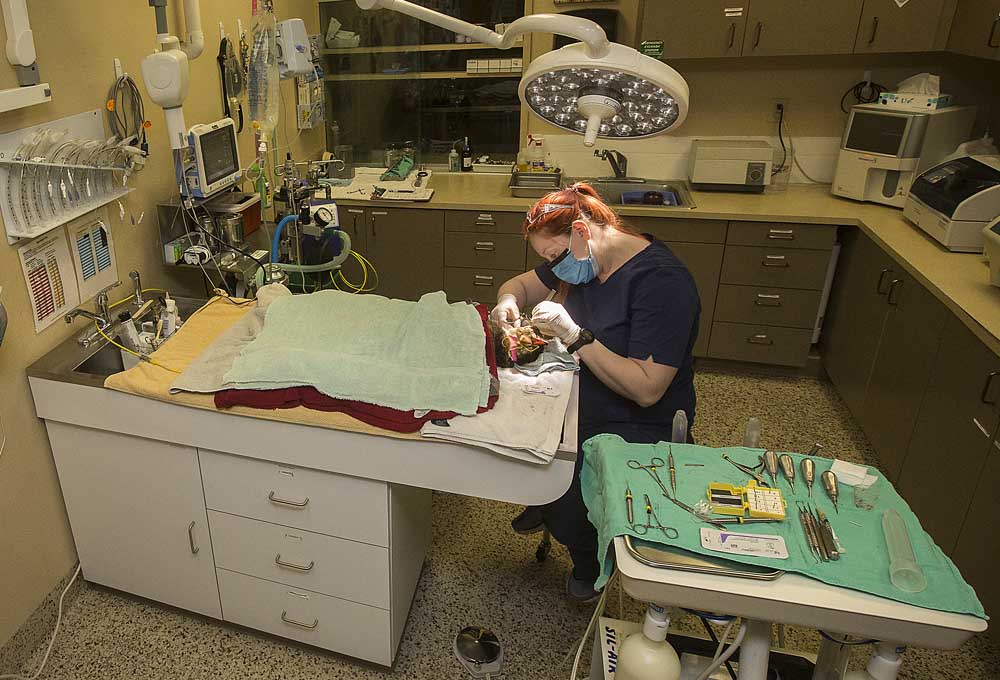Central Oregon veterinary clinics resume non-emergency procedures
Published 5:00 am Friday, May 8, 2020

- Veterinarian Stephanie Kadasi stitches up an area where she removed several teeth while performing an elective surgery on a cat at the Humane Society of Central Oregon on Thursday, May 7, 2020. The surgery was put on hold for several weeks due to the COVID-19 pandemic, which slowed down the adoption process for the cat and it's potential owners.
Veterinary clinics have resumed nonemergency services, after the procedures were canceled for more than a month to preserve masks and other protective gear for hospitals dealing with the COVID-19 pandemic.
Gov. Kate Brown lifted the order May 1, allowing veterinary clinics to do routine spaying and neutering and dental cleanings.
The restriction was tough on clinics in Central Oregon. Clinics estimate they lost at least 20% of their business and are now trying to cram a month’s worth of appointments into their current workload.
Dr. Byron Maas, veterinarian at Bend Veterinary Clinic, said his clinic has to catch up on at least 40 nonemergency appointments that were postponed.
“We have a backlog now, so we are going to be busier than usual,” Maas said.
Oregon Health Authority offered guidelines for veterinary clinics as they resumed nonemergency procedures. Suggestions included having a two-week supply of protective medical gear and have staff keep a 6-foot distance between themselves and clients.
Maas said his staffers have to use their judgment on a case-by-case basis since some procedures are not possible to do 6 feet apart.
For example, drawing a dog’s blood takes two staff members: One to hold the dog and one to draw the blood.
“It’s impossible to do that and stay 6 feet apart,” Maas said. “We all understand there is now some inherent risk with everything that we do because of the potential of the virus and people being in close proximity.”
During the restriction, Maas considered neutering and spaying animals in foster care and shelters as essential. Bend Veterinary Clinic works closely with the Humane Society of Central Oregon, Humane Society of the Ochocos and local rescue and foster organizations.
“We wanted to be sure they weren’t getting held up and all of a sudden their animals can’t get adopted,” Maas said.
Lynne Ouchida, community outreach manager for the Humane Society of Central Oregon, said the shelter had to stop all spay and neuter surgeries during the governor’s order. The shelter still allowed animal adoptions, but invited the pets back to be spayed or neutered at a later time, Ouchida said.
“The order to cease nonemergency surgeries has not impacted our ability to adopt animals into new homes,” Ouchida said. “The Humane Society of Central Oregon has been following the industry standard to delay spay and neuter surgeries during this time.”
The restriction on nonemergency surgeries had the largest impact on Bend Spay and Neuter, which has been closed since March 20 due to the governor’s order. The nonprofit organization offers affordable, preventative veterinary care for cats and dogs in Central Oregon.
Since closing, the organization had to reschedule more than 360 spay and neuter surgeries, said Dr. Sarah Bird, medical director at Bend Spay and Neuter.
“We have a lot of catch-up to do,” Bird said.
Bend Spay and Neuter, located on Wilson Avenue in Bend, plans to reopen May 20. The organization operates Tuesday through Saturday.
To address its backlog, Bend Spay and Neuter will add extra surgery time on Saturdays, Bird said.
At La Paw Animal Hospital in Bend, veterinarian and owner Dr. Deb LaPaugh estimates her clinic has fit about three weeks of work into the past week.
“I’m just packing them in as much as I can,” she said.
LaPaugh said there is a concern locally that the work of places like Bend Spay and Neuter to decrease the pet population may have been undone during the restriction on elective surgeries.
“There is obvious concern about animals accidentally getting pregnant,” LaPaugh said. “Animals don’t do social distancing and they don’t wear condoms.”
Despite the extra work to get caught up, LaPaugh and her staff are enjoying more routine procedures like giving vaccines to puppies. For the last few weeks, the clinic mostly handled tragic emergency situations.
“It’s been feeling a bit depressing,” LaPaugh said. “But we are getting back to normal appointments.”






